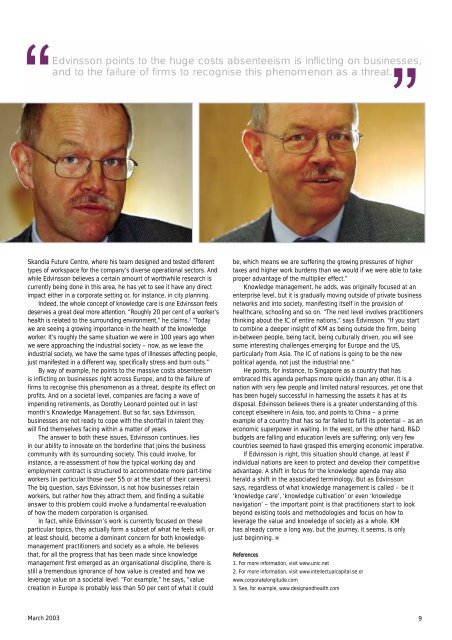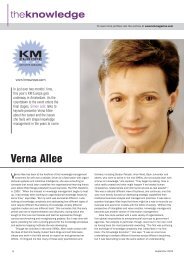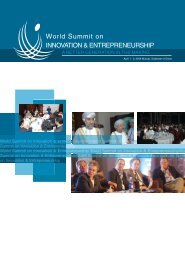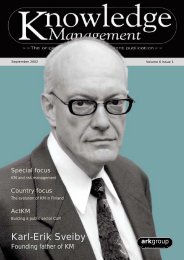Leif Edvinsson
Leif Edvinsson Leif Edvinsson - Entovation International
Leif Edvinsson Leif Edvinsson - Entovation International
- No tags were found...
You also want an ePaper? Increase the reach of your titles
YUMPU automatically turns print PDFs into web optimized ePapers that Google loves.
““<strong>Edvinsson</strong> points to the huge costs absenteeism is inflicting on businesses,and to the failure of firms to recognise this phenomenon as a threat.Skandia Future Centre, where his team designed and tested differenttypes of workspace for the company’s diverse operational sectors. Andwhile <strong>Edvinsson</strong> believes a certain amount of worthwhile research iscurrently being done in this area, he has yet to see it have any directimpact either in a corporate setting or, for instance, in city planning.Indeed, the whole concept of knowledge care is one <strong>Edvinsson</strong> feelsdeserves a great deal more attention. “Roughly 20 per cent of a worker’shealth is related to the surrounding environment,” he claims. 3 “Todaywe are seeing a growing importance in the health of the knowledgeworker. It’s roughly the same situation we were in 100 years ago whenwe were approaching the industrial society – now, as we leave theindustrial society, we have the same types of illnesses affecting people,just manifested in a different way, specifically stress and burn outs.”By way of example, he points to the massive costs absenteeismis inflicting on businesses right across Europe, and to the failure offirms to recognise this phenomenon as a threat, despite its effect onprofits. And on a societal level, companies are facing a wave ofimpending retirements, as Dorothy Leonard pointed out in lastmonth’s Knowledge Management. But so far, says <strong>Edvinsson</strong>,businesses are not ready to cope with the shortfall in talent theywill find themselves facing within a matter of years.The answer to both these issues, <strong>Edvinsson</strong> continues, liesin our ability to innovate on the borderline that joins the businesscommunity with its surrounding society. This could involve, forinstance, a re-assessment of how the typical working day andemployment contract is structured to accommodate more part-timeworkers (in particular those over 55 or at the start of their careers).The big question, says <strong>Edvinsson</strong>, is not how businesses retainworkers, but rather how they attract them, and finding a suitableanswer to this problem could involve a fundamental re-evaluationof how the modern corporation is organised.In fact, while <strong>Edvinsson</strong>’s work is currently focused on theseparticular topics, they actually form a subset of what he feels will, orat least should, become a dominant concern for both knowledgemanagementpractitioners and society as a whole. He believesthat, for all the progress that has been made since knowledgemanagement first emerged as an organisational discipline, there isstill a tremendous ignorance of how value is created and how weleverage value on a societal level. “For example,” he says, “valuecreation in Europe is probably less than 50 per cent of what it couldbe, which means we are suffering the growing pressures of highertaxes and higher work burdens than we would if we were able to takeproper advantage of the multiplier effect.”Knowledge management, he adds, was originally focused at anenterprise level, but it is gradually moving outside of private businessnetworks and into society, manifesting itself in the provision ofhealthcare, schooling and so on. “The next level involves practitionersthinking about the IC of entire nations,” says <strong>Edvinsson</strong>. “If you startto combine a deeper insight of KM as being outside the firm, beingin-between people, being tacit, being culturally driven, you will seesome interesting challenges emerging for Europe and the US,particularly from Asia. The IC of nations is going to be the newpolitical agenda, not just the industrial one.”He points, for instance, to Singapore as a country that hasembraced this agenda perhaps more quickly than any other. It is anation with very few people and limited natural resources, yet one thathas been hugely successful in harnessing the assets it has at itsdisposal. <strong>Edvinsson</strong> believes there is a greater understanding of thisconcept elsewhere in Asia, too, and points to China – a primeexample of a country that has so far failed to fulfil its potential – as aneconomic superpower in waiting. In the west, on the other hand, R&Dbudgets are falling and education levels are suffering; only very fewcountries seemed to have grasped this emerging economic imperative.If <strong>Edvinsson</strong> is right, this situation should change, at least ifindividual nations are keen to protect and develop their competitiveadvantage. A shift in focus for the knowledge agenda may alsoherald a shift in the associated terminology. But as <strong>Edvinsson</strong>says, regardless of what knowledge management is called – be it‘knowledge care’, ‘knowledge cultivation’ or even ‘knowledgenavigation’ – the important point is that practitioners start to lookbeyond existing tools and methodologies and focus on how toleverage the value and knowledge of society as a whole. KMhas already come a long way, but the journey, it seems, is onlyjust beginning. !References1. For more information, visit www.unic.net2. For more information, visit www.intellectualcapital.se orwww.corporatelongitude.com3. See, for example, www.designandhealth.comMarch 2003 9







